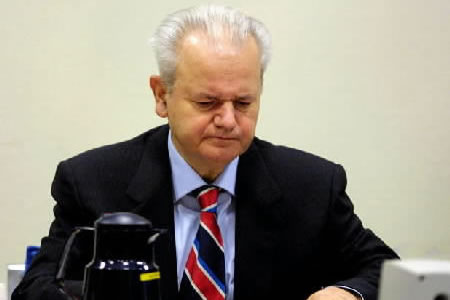Home
SREBRENICA OPERATION WAS COMMANDED BY OFFICERS ON BELGRADE PAYROLL
Former VRS officer and participant in the July 1995 attack on Srebrenica testifies that although Serbian MUP and VJ forces did not directly participate in the operation, most of the commanding officers of the VRS units involved were on the payroll of the Yugoslav Army via Belgrade.
 Slobodan Milosevic in the courtroom
Slobodan Milosevic in the courtroom Not for the first time during this trial, Slobodan Milosevic conducted his cross-examination of a prosecution witness in a manner which could create the impression, if one did not know better, that it was the defense case and the accused was questioning his witness. Going through the written statement of protected witness B-1804, Milosevic asked questions that he knew would be answered in the affirmative.
B-1804 is a former VRS officer, a participant in the Srebrenica operation of July 1995. Protective measures were granted because of threats his family received after he decided to testify at the Milosevic trial. For the same reason, most of the testimony was given in private session, making it difficult for the public to get a full picture of its significance. The brief summary read out by the prosecutor indicated that the statement related to events in the Zvornik area between 1992 and 1995, particularly to the attack on Srebrenica in July 1995. The prosecutor was also able to admit into evidence a large number of VRS documents through this witness.
Milosevic tried to turn the former JNA and VRS officer into his own witness and use him to prove some of his hypotheses: that Serbs were the first victims in Bosnia and that "tens or hundreds of them were killed before the conflict began"; that Muslims were arming themselves and organizing paramilitary formations that caused conflicts, blocked JNA barracks and attacked convoys pulling out of Bosnia and Herzegovina; and that forces under the command of Naser Oric burned and plundered more than 100 Serb villages in the wider Srebrenica area and killed countless Serb civilians, making it “clear that if the enclave fell, there would be reprisals.” The witness answered all such questions of the accused in the affirmative, including the question about "a large number of orders issued by the Main Staff and the Supreme Command of the VRS to the effect that laws of war must be respected and civilians and prisoners of war treated in accordance with the Geneva Conventions." The witness confirmed that his unit had received such orders from the Drina Corps command.
The impression that the defense case had begun too early was quashed, however, when Geoffrey Nice, appearing for the Prosecution, asked a few questions in re-examination. Referring to a series of orders shown to the witness by the accused, Nice produced a directive issued by Karadzic in March 1995 to the Drina Corps which contained the following order: "A situation of total insecurity must be created by planned and well-thought out operations, quelling any hope of survival for the inhabitants of Srebrenica and Zepa."
The witness confirmed that this directive of the supreme command in fact gave "broader guidelines for operations over a longer period of time." The "operations" culminated in July 1995 in Srebrenica, Orahovac, Petkovci, Pilice and other execution sites in the enclave.
Since the witness wrote in his statement that "he considered himself to be a member of the VJ" – which was paying his salary until his demobilization from the VRS – the prosecutor asked him if that was still the case. "Yes,” the former VRS officer answered curtly.
In reference to Milosevic's challenging the fact that the VRS could not have survived without VJ support, the prosecutor asked the witness if his unit would have been able to survive without the officers that led it. The witness answered that no unit could survive without its officers. When prompted further by the prosecutor, he specified that in his unit's staff, "15 to 22 officers were on VJ payroll" at various times during the war.
Both in his written statement and during cross-examination, the witness stated that as far as he knew, no VJ or Serbian MUP units had taken part in the attack on Srebrenica. Although it was not stated explicitly, the conclusion that can be drawn from the testimony of witness B-1804 is that his unit – led by officers on the VJ payroll – had played an important role in the Srebrenica operation mounted by the VRS in July 1995.
Linked Reports
- Case : Milosevic Slobodan - "Kosovo, Croatia and Bosnia"
- 2004-02-10 THE BIGGEST COVER-UP IN UN HISTORY
- 2004-02-12 VICIOUS CIRCLE OF BLOOD AND REVENGE
- 2004-02-22 WHAT IF MILOSEVIC DOES NOT CONSENT TO A REPLACEMENT FOR JUDGE MAY?
- 2004-02-25 PROSECUTION WILL NOT CONTINUE WITH ITS CASE AGAINST MILOSEVIC
